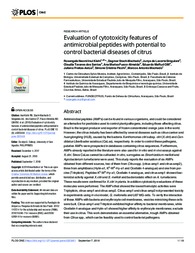Evaluation of cytotoxicity features of antimicrobial peptides with potential to control bacterial diseases of citrus.
Evaluation of cytotoxicity features of antimicrobial peptides with potential to control bacterial diseases of citrus.
Author(s): KISHI, R. N. I.; STACH-MACHADO, D.; SINGULANI, J. de L.; SANTOS, C. T. dos; FUSCO-ALMEIDA, A. M.; CILLI, E. M.; ASTUA, J. de F.; PICCHI, S. C.; MACHADO, M. A.
Summary: considered an alternative for pesticides used to control plant pathogens, including those affecting citrus. Brazil is the largest producer and exporter of frozen concentrated orange juice in the world. However, the citrus industry has been affected by several diseases such as citrus canker and huanglongbing (HLB), caused by the bacteria Xanthomonas citri subsp. citri (X.citri) and Candidatus Liberibacter asiaticus (CaLas), respectively. In order to control these pathogens, putative AMPs were prospected in databases containing citrus sequences. Furthermore, AMPs already reported in the literature were also used for in vitro and in vivo assays against X.citri. Since CaLas cannot be cultivated in vitro, surrogates as Sinorhizobium meliloti and Agrobacterium tumefaciens were used. This study reports the evaluation of six AMPs obtained from different sources, two of them from Citrus spp. (citrus-amp1 and citrus-amp2), three from amphibians (Hylin-a1, K0-W6-Hy-a1 and Ocellatin 4-analogue) and one from porcine (Tritrpticin). Peptides K0-W6-Hy-a1, Ocellatin 4-analogue, and citrus-amp1 showed bactericidal activity against X.citri and S. meliloti and bacteriostatic effect on A. tumefaciens. These results were confirmed for X.citri in planta. In addition cytotoxicity evaluations of these molecules were performed. The AMPs that showed the lowest hemolytic activities were Triptrpticin, citrus-amp1 and citrus-amp2. Citrus-amp1 and citrus-amp2 not presented toxicity in experiments using in vivo model, G. mellonella and U87 MG cells. To verify the interaction of these AMPs with bacteria and erythrocyte cell membranes, vesicles mimicking these cells were built. Citrus-amp1 and Tritrpticin exhibited higher affinity to bacterial membranes, while Ocellatin 4-analogue and Hylin-a1 showed higher affinity to erythrocyte membranes; exclude their use in citrus. This work demonstrates an essential alternative, trough AMPs obtained from Citrus spp., which can be feasibly used to control bacterial pathogens.
Publication year: 2018
Types of publication: Journal article
Unit: Embrapa Cassava & Fruits
Observation
Some of Embrapa's publications are published as ePub files. To read them, use or download one of the following free software options to your computer or mobile device. Android: Google Play Books; IOS: iBooks; Windows and Linux: Calibre.
Access other publications
Access the Agricultural Research Database (BDPA) to consult Embrapa's full library collection and records.
Visit Embrapa Bookstore to purchase books and other publications sold by Embrapa.

